WarGames Blu-ray Movie
HomeWarGames Blu-ray Movie 
War GamesMetro-Goldwyn-Mayer | 1983 | 113 min | Rated PG | Aug 21, 2012
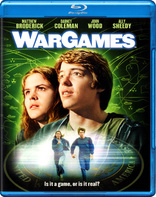
Movie rating
7.5 | / 10 |
Blu-ray rating
| Users | 4.4 | |
| Reviewer | 4.0 | |
| Overall | 4.1 |
Overview
WarGames (1983)
A young computer whizz kid accidentally connects into a top secret super-computer which has complete control over the U.S. nuclear arsenal. It challenges him to a game between America and Russia, and he innocently starts the countdown to World War 3. Can he convince the computer he wanted to play a game and not the real thing?
Starring: Matthew Broderick, Dabney Coleman, John Wood (I), Ally Sheedy, Barry CorbinDirector: John Badham
| Teen | Uncertain |
| Psychological thriller | Uncertain |
| Thriller | Uncertain |
| Drama | Uncertain |
Specifications
Video
Video codec: MPEG-4 AVC
Video resolution: 1080p
Aspect ratio: 1.85:1
Original aspect ratio: 1.85:1
Audio
English: DTS-HD Master Audio 5.1 (48kHz, 24-bit)
Spanish: DTS-HD Master Audio Mono
French: DTS-HD Master Audio Mono
German: DTS-HD Master Audio Mono (48kHz, 24-bit)
Italian: DTS-HD Master Audio Mono
Subtitles
English SDH, French, German, Italian, Japanese, Portuguese, Spanish, Dutch, Polish
Discs
50GB Blu-ray Disc
Single disc (1 BD)
Playback
Region free
Review
Rating summary
| Movie | 3.5 | |
| Video | 4.5 | |
| Audio | 4.0 | |
| Extras | 3.5 | |
| Overall | 4.0 |
WarGames Blu-ray Movie Review
Gaming the System
Reviewed by Michael Reuben August 24, 2012It may be impossible for anyone who wasn't alive in the 1950s or 1960s to fully appreciate the degree to which nuclear paranoia saturated the popular consciousness. School children routinely practiced atom bomb drills (as if cowering in crash positions in the basement could protect anyone from a nuclear blast); people built bomb shelters in back yards; occasionally you'd see a disarmament protest on the news. These concerns reached their height after the Cuban missile crisis in October 1962, when the U.S. and the Soviet Union came to the brink of war, only to back down at the last minute, because, in the end, neither side was crazy enough to risk what strategists had dubbed "mutually assured destruction". It's certainly no accident, given the customary lead time for making and releasing a film, that the year 1964 saw the release of two major films on the subject, one of them a bona fide classic. Both Dr. Strangelove and Fail Safe directly addressed the Cold War's threat of human self-annihilation. Despite radically different styles, both were cautionary tales, and neither of them ended happily. Two decades later, though, the national attitude toward nuclear threat had changed—which just goes to prove that, given enough time, people can get used to almost anything. The threat of nuclear war had come to be regarded as part of the daily background noise: something to be managed, of course, and avoided, certainly, but an inevitable concomitant of life in the modern age. Thus, in place of the bleak Fail Safe or the savagely satirical Strangelove, we get the popcorn frivolity of WarGames, which hasn't a truly earnest bone in its body. (The original director, Martin Brest, was fired when he tried to take the film in a darker direction.) Now don't get me wrong: I love WarGames. It's a lot of fun, but it's also a frivolous film that can't be bothered to take seriously even the computer technology on which it supposedly provided a startling exposé to the audience of its era. (On the commentary track recorded in 1998, the writers admit to some of their cheats.) None of the filmmakers seem to have noticed the irony that the film spends most of its running time urging that human beings should always be the decisionmakers, only to have a computer deliver the damning pronouncement that nuclear war is unwinnable.

WarGames opens with a prologue featuring two actors who would both become well known in future years: John Spencer (The West Wing and L.A. Law) and Michael Madsen (Kill Bill, Reservoir Dogs). Here they play military officers manning a command station that controls missile silos. During a simulated nuclear attack, which the officers aren't told is only a drill, Spencer's character can't bring himself to take the final step to launch the missiles that will kill twenty million people in Russia. Enough officers in other silos exhibit the same reluctance to prompt a government computer expert named McKittrick (Dabney Coleman) to recommend that the human element be removed from the silos and the country's nuclear arsenal be put under control of the master computer known as WOPR (for War Operation Plan Response). The President's advisors agree, much to the consternation of General Behringer (Barry Corbin), chief commander at Norad. With WOPR now in charge, we meet the hero of WarGames, David Lightman (baby-faced Matthew Broderick), a seventeen-year-old Seattle computer geek who spends all his spare time either in video arcades or goofing around with PCs and modems so antique that they'll alternately fascinate and horrify anyone born in the era of fiber optics, wi-fi and hard drives measured in gigabytes. Despite being smart and industrious (when he wants to), David does poorly in school, but this gives him the opportunity to impress a classmate named Jennifer (Ally Sheedy), when they both fail biology. He hacks into the school computer and changes their grades. David's main project, however, is hacking a computer game company called Protovision, which has new games coming to market shortly. He mistakes an open telephone line for Protovision's computer, but it's really a Defense Department contractor that feeds directly into WOPR. When David asks it to "List Games", the list includes "Global Thermonuclear War". The list also includes "Falken's Maze", which leads David to Prof. Steven Falken (John Wood), an eminent mathematician and game theorist now reportedly dead, who was McKittrick's mentor. By reading everything he can find about Falken, David stumbles on a "back door" password that Falken left in the system and is able to bypass all of the government security. Then he challenges the computer to a game of Global Thermonuclear War. All hell breaks loose at Crystal Palace, the mountain headquarters of Norad. General Behringer and his staff ultimately realize that the attack they're seeing on their screens is a simulation, and shortly thereafter David is in custody and being questioned by McKittrick. No one can believe that a seventeen-year-old could have penetrated a high-security government computer on his own. Meanwhile, David realizes that the system is still trying to "win" the game he started, but in the real world with real missiles. No one will listen to him as the computer continues its countdown. One reason why WarGames holds up despite the antiquity of its computer terminals and primitive display screens is that the film never depended on technological accuracy, despite all the research its screenwriters did (which they discuss at length in the disc's extras). To take an obvious example: An artificial intelligence sophisticated enough to engage in the various deceptions that the WOPR computer (or "Joshua" as David calls it, for reasons explained in the film) deploys against the American military should also be smart enough to understand the difference between reality and a game. Joshua dismisses the distinction with the silicon equivalent of a shrug. An even more obvious example is the mechanized voice with which Joshua speaks. David connects a digital translator to his home PC to create the voice as entertainment for Jennifer, thereby allowing Joshua to deliver his most famous line: "Shall we play a game?" But for the rest of the film, the same voice emanates from every computer on which Joshua types text, with no indication of how the voice is being created. In the film's final scene, the voice even echoes through the command center at Crystal Palace, where none of the text screens have previously had the power of speech. On the commentary track, the writers admit that this makes no sense, but say that audiences accept it anyway. Of course they do. They accept that this is a fantasyland where computers and whiz kids have whatever powers are necessary to move the story along. Joshua might as well be a resident of Hogwarts. The real secret to the appeal of WarGames is its humor, some of which was there even in Martin Brest's original, darker conception. It was Brest who filmed the wonderful sequence where David and Jennifer seek assistance from Malvin and Jim, two professional programmers played by Eddie Deezen and the great character actor Maury Chaykin, who fight like an old married couple. It was also Brest who cast William Bogert and Susan Davis as David's flakey parents (she believes corn on the cob should be eaten raw), who bring a welcome comic energy whenever they're onscreen. And it was Brest who spotted the winning chemistry between Broderick and Sheedy, which was so effective that Sheedy's character was written into the second half of the film after she was cast. But it was Badham who, when he replaced Brest as director, significantly shifted the film's tone, especially in the latter half, by recasting the role of Gen. Behringer with Barry Corbin. Corbin's Texas good ol' boy style and exasperated expression become the principal comic relief whenever he's on screen, and because his character is constantly in conflict with McKittrick, Corbin puts Dabney Coleman in the unaccustomed role of playing the straight man. There is simply no upstaging Corbin's delivery of a remark like: "Mr. McKittrick, after very careful consideration, sir, I've come to the conclusion that your new defense system sucks." And let's not even talk about the spark plug line, which Corbin wrote for himself (at Badham's request). Of course, there's never any doubt that World War III will be averted, or that Professor Falken's bright A.I. will learn the obvious lesson that nuclear war is a fool's game. No one wants a nuclear war. It's always forced upon us by the other side.
WarGames Blu-ray Movie, Video Quality 
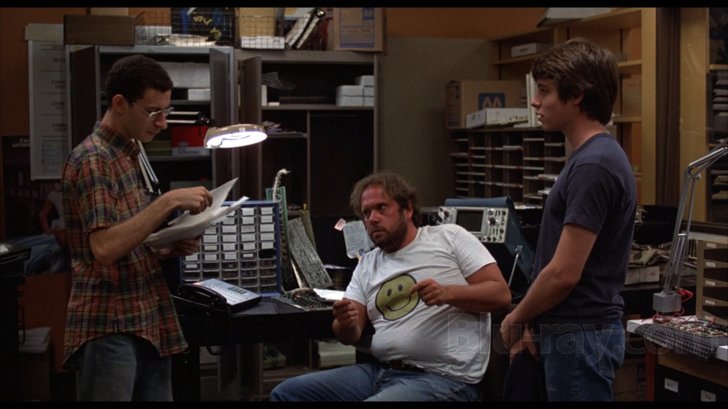
WarGames was shot by the late William A. Fraker (Bullitt, Rosemary's Baby), one of the great cameramen from the old studio system who remained constantly in demand after its demise, winning the A.S.C.'s lifetime achievement award in 2000. The film looks superb on Fox/MGM's 1080p, AVC-encoded Blu-ray, very much like the style of film that a DP of Fraker's vintage was shooting in an era before home video had changed the audience's perception of what was considered pleasing to the eye: textured, low-contrast, delicately detailed, with just enough color saturation to distinguish hues without bleeding or overstatement. This was an image photographed for large-screen projection and never intended to "pop" off of small screens in living rooms (or on handheld devices), and it has been faithfully rendered as it was intended to be seen. The depth of detail is particularly evident in scenes like the wide shots of the Crystal Palace command center, where you can make out individual people at desks and maps on each of the individual screens. To take another example, in the scene where Professor Falken lands in a helicopter, the figure of the pilot sitting next to him is clearly visible, which has not been the case in any previous home video version of the film. Grain is plainly evident but not distracting, and there is no indication of high frequency filtering or artificial sharpening. No compression errors were in evidence.
WarGames Blu-ray Movie, Audio Quality 
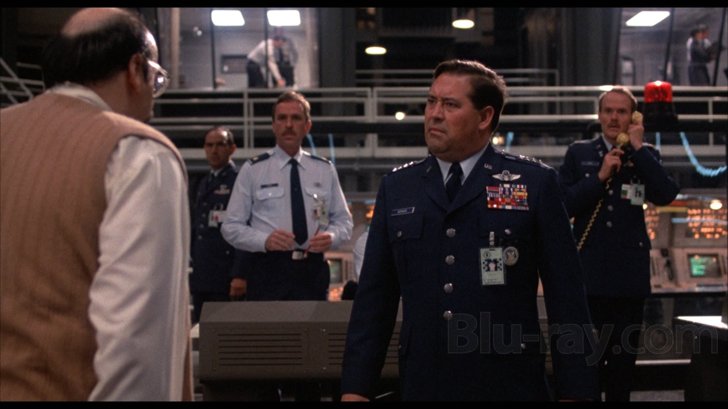
WarGames was released in Dolby Stereo, and IMDb indicates a 70mm release with six-track sound. The Blu-ray's DTS-HD MA 5.1 certainly sounds like an original mix and not a remix created at a later date. (The film's sound mix was nominated for an Oscar.) Bass extension, always the strong suit of the 70mm sound format, is deep and powerful, and this becomes immediately evident during the prologue sequence when the missiles begin their pre-launch sequence in their silos. In the elaborate finale at Crystal Palace, the computer-simulated missile strikes resound with repeated deep tones. The playful electronic score by Arthur B. Rubinstein (Badham's usual film composer) bounces back and forth between left and right speakers, taking more advantage of the stereo separation than most contemporary scores. The dialogue is always clear.
WarGames Blu-ray Movie, Special Features and Extras 
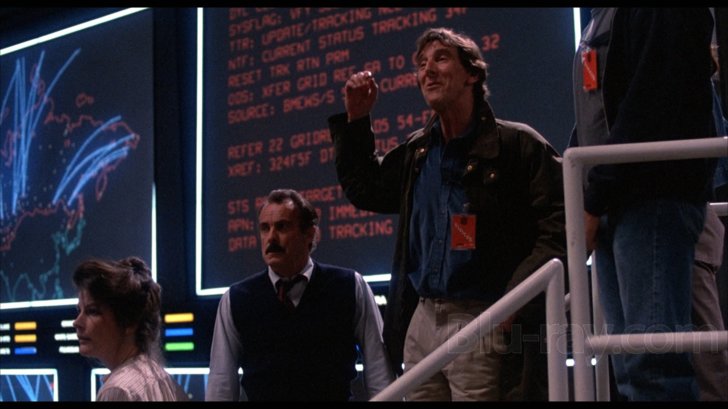
The extras have been ported over from the "25th Anniversary Edition" DVD released in 2008. Omitted are the "Interactive Superpower Weapons Briefing Gallery" and the sneak peek at WarGames: The Dead Code. The commentary was originally recorded for the first DVD of WarGames released in 1998. As always with the Blu-rays it releases for MGM, Fox has mastered the disc with BD-Java, while omitting any main menu as well as the ability to create bookmarks. It's a moronic design to which Fox is stubbornly clinging.
- Commentary by Directory John Badham and Writers Walter Parkes and Lawrence Lasker: Taken together with the "Loading WarGames" documentary, this lively commentary provides a detailed account of the various contributions to the film by Brest and Badham, down to individual scenes. All three commentators have remarkably vivid recall of the production, and they're good at prompting each other's memories about ad libs, setbacks, contributions by various participants and other filmmaking minutia.
- Loading WarGames (SD; 1.85:1, enhanced; 45:04): This frank retrospective documentary reviews the surprisingly troubled history of the film, which saw the initial director, Martin Brest, fire the film's writers, Parkes and Lasker, during pre-production, only to be fired himself by the studio shortly after shooting began. Badham, who was hired to replace Brest, promptly rehired Parkes and Lasker, and asked to see their latest version of the script. Rewrites continued throughout principal photography. Twenty-five years after the fact, Parkes, Lasker, Badham, Broderick and Sheehy recall the experience. Other participants include executive producer Leonard Goldberg, writer Tom Mankiewicz (who supplied a key scene), DP William Fraker and actor Barry Corbin, who is still hilarious.
- Attack of the Hackers (SD; 1.85:1, enhanced; 13:32): A brief overview of Eighties hacker culture by various experts, including former national security advisor Richard A. Clarke.
- Inside Norad: Cold War Fortress (SD; 1.85:1, enhanced; 10:50): After a brief introductory sketch of the history of the Cold War, this documentary offers a tour of the Cheyenne Mountain facility on which the film's "Crystal Palace" was loosely based.
- Tic Tac Toe: A True Story (SD; 1.85:1, enhanced; 4:29): A mock history of the game, with multiple nods to the film in which it plays a crucial role.
- Theatrical Trailer (HD, 1080p; 1.85:1; 2:20): "Is this a game or is it real?" In a wise move, the trailer omits the computer's answer.
WarGames Blu-ray Movie, Overall Score and Recommendation 
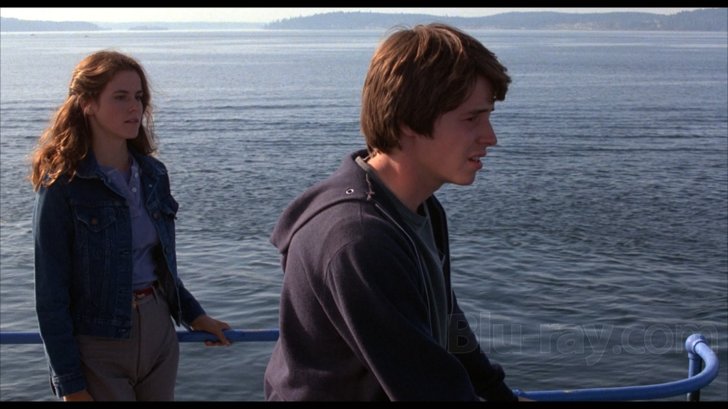
WarGames is a superior entertainment, and it has remained so even as both the underlying technology and geopolitics have been completely transformed. As with many pop movies, the real attraction is wish fulfillment. One can only dream that a couple of plucky teenagers and a really smart computer are all it would take to show the world's leaders the error of their ways. Highly recommended.
Other editions
WarGames: Other Editions

WarGames
1983

WarGames
Limited Edition Collectible Cover Art
1983

WarGames
Limited Edition Collectible Cover Art
1983

WarGames
Limited Edition Collectible Cover Art
1983

WarGames 4K
1983
Similar titles
Similar titles you might also like

Hackers 4K
Collector's Edition
1995

Unthinkable
2010

The Quiet
2005

Fail Safe
1964

Nerve
2016

White Bird in a Blizzard
2014

Crime + Punishment in Suburbia
2000

Red Dawn 4K
1984

Phantom
2013

The Wild Life
1984

Gimme Shelter
2013

Tuff Turf
1985

Three O'Clock High
Collector's Edition
1987

Seven Days in May
Warner Archive Collection
1964

Adoration
2008

S. Darko: A Donnie Darko Tale
2009

Gossip
2000

Date and Switch
2014

Thoroughbreds
2017

I'm Not Ashamed
2016